

American Society for Indexing: Software. Please Note: If you are an author or editor needing to prepare an index to your book or other publication, you may wish to consult our Indexer Locator, which lists professional indexers, their areas of expertise, and full contact information.
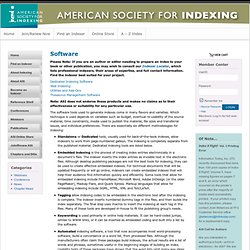
Find the indexer best suited for your project. Dedicated Indexing SoftwareWeb IndexingUtilities and Add-OnsThesaurus Management Software Note: ASI does not endorse these products and makes no claims as to their effectiveness or suitability for any particular use. The software tools used to generate indexes come in many flavors and varieties. Which technique is used depends on variables such as budget, eventual re-usability of the source material, time constraints, media used to publish the material, file sizes and transferral issues, and individual preferences. Standalone or Dedicated tools, usually used for back-of-the-book indexes, allow indexers to work from page-numbered galleys. Dedicated Indexing Software Web Indexing HTML/Prep. PDF Index Generator. NY State Archives: Indexing Software. The New York State Archives has compiled this list of indexing software vendors to aid government agencies, local governments, and other entities searching for companies and individuals providing indexing software vendor services.
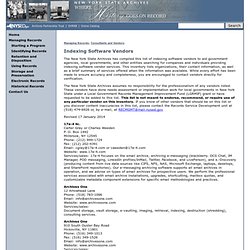
This inventory lists organizations, their contact information, as well as a brief summary of services offered when the information was available. While every effort has been made to ensure accuracy and completeness, you are encouraged to contact vendors directly for verification. The New York State Archives assumes no responsibility for the professionalism of any vendors listed. These vendors have done needs assessment or implementation work for local governments in New York State under a Local Government Records Management Improvement Fund (LGRMIF) grant or have requested to be added to this list. This list is not meant to endorse, recommend, or require use of any particular vendor on this inventory. Revised 17 January 2014 17a-4 llc.
DCA, Inc. Top. Indexing Tools. Tim Craven - Freeware. 32-bit Windows packages (The self-extractors for these packages currently all require 16-bit support.
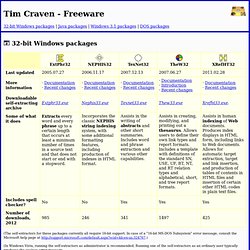
In case of a "16-bit MS-DOS Subsystem" error message, consult the Microsoft help page at (In Windows Vista, running the self-extractors as administrator is recommended. Running one of the self-extractors as an ordinary user typically produces the useless error message C:\Users\username\Local\Temp\_INS0432. (An alternative to running a self-extractor as a program is to change the extension to , extract the contents, and run in the folder containing the extracted files.) (Using XP compatibility mode may also help with some problems.) (In Windows XP and Vista, the applications are best viewed with "Windows and Buttons" set to "Windows Classic Style".) (There are no specifically 64-bit versions of these programs, nor are there likely to be. Article on using TheW32: De Vorsey, K.L.; Elson, C.; Gregorev, N.P.; Hansen, J. 2006. For sample XRefHT32 indexes, see Java packages Source code.
DOS packages. InfoRapid « Digitalized Documentation Research. If you have the same dream like me- to get all the information around a topic with only one search engine , you might have already tested the water of Linked Data or Semantic Web.
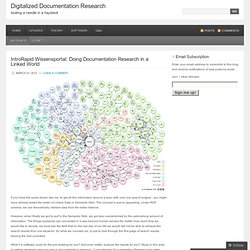
The concept is just so appealing. Under RDF schema, we can theoretically retrieve data from the entire Internet. However, when finally we got to surf in the Semantic Web, we got also overwhelmed by the astonishing amount of information. The things (subjects) are connected in a way beyond human senses.No matter how much time we would like to devote, we must see the faith that on the last day of our life we would still not be able to exhaust the search results from one keyword.
So what we normally do, is just to look through the first page of search results, leaving the rest unclicked. What if a software could do the pre-reading for you? My first instinct is that this is a perfect combination of NLP and ego-central network. Moreover, we can further choose “more details.” Inforapid. I used to be undecided, but now I'm not so sure. If you have a large collection of notes then there will be times when you cannot find the note which you want to find even though you know that it exists somewhere within the collection of documents.
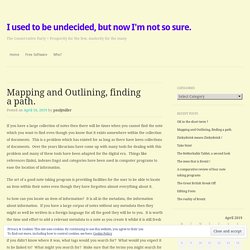
This is a problem which has existed for as long as there have been collections of documents. Over the years librarians have come up with many tools for dealing with this problem and many of these tools have been adapted for the digital era. Things like references (links), indexes (tags) and categories have been used in computer programs to ease the location of information. The art of a good note taking program is providing facilities for the user to be able to locate an item within their notes even though they have forgotten almost everything about it.
So how can you locate an item of information? Metadata comes in many forms, not just the obvious ones. Search is often portrayed as the most useful way of finding things but in my experience it is not used as often as the other methods.